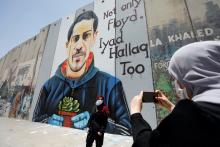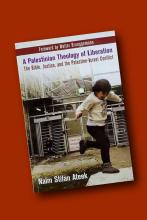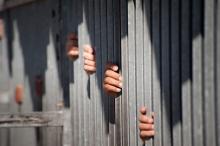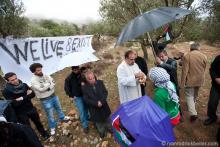israel palestine

Peter Beinart, author of Being Jewish After the Destruction of Gaza, rejects the idea that the liberation of Palestine is an antimsemitic project. In fact, he argues that Zionism has become an idol for some Jewish leaders, and advocating for Palestinian people

For the ninth year in a row, Sojourners honors Women’s History Month with an article highlighting revolutionary women shaping the church. This year’s list includes theologians, filmmakers, illustrators, musicians, pastors, and academics. Our nominees engage in diverse work, but these women are united through a fearless pursuit of justice. They lead through empathy. They build community. They fight against rising tides of hopelessness in our world with messages of radical and inclusive love.

The tangled web of some U.S. and international evangelical and Pentecostal leaders blessing Israel’s expansionist ambitions toward the West Bank and more has a long and complicated history. President Trump has wrapped his political arms around those religious allies today in a craven attempt to preserve his evangelical base. But other Christians – including many prominent evangelicals – have consistently refused to condone Israeli occupation of Palestinian land as a supposedly “biblically sanctioned” real estate plan.

AS ISRAELI PRIME Minister Benjamin Netanyahu prepared this spring to annex significant chunks of the West Bank and further tighten control over Palestinians, with the acquiescence of erstwhile rival Benny Gantz, the blueprint and rationale for his actions has been clear: Donald Trump’s so-called “peace” plan. Since the announcement of the U.S. plan in late January, some have explained why it is harmful to even the most basic requirements for peace—but few have analyzed how the Trump plan dealt with Palestinian Christians.
The architects behind the so-called “Peace to Prosperity” plan prefer the nonexistence of Palestinian Christians. These authors share an ideological bias that is troubled by the fact that Christians are an integral part of the Palestinian people.
The plan mentions Jews and Christians on one side and Muslims on the other, as if to communicate that this is a religious conflict between the Judeo-Christian tradition and Islam. While this may serve the partisan domestic purposes of Mr. Trump and Mr. Netanyahu, this is not our lived reality as Palestinian Christians.

EVANGELICALS IN THE United States and Christians in the Middle East had vastly differing responses to President Trump’s actions on Jerusalem that sparked the explosion of violence this spring on Gaza’s border with Israel.
In the United States, 53 percent of evangelicals supported the decision to recognize Jerusalem as the capital of Israel, according to a Brookings Institute poll, and it was greeted with unadulterated joy by prominent leaders of the Religious Right. A wide range of church leaders in the Middle East were decidedly less positive about Trump’s actions, pointing to the potential threat not only to peace in the region but also to the very presence of Christians in the Holy Land.
How could an action so many U.S. Christians supported elicit such opposition from Christians across the denominational landscape of the Middle East?
There are, of course, deep divides within Christianity about the place of the Holy Land and role of the Jewish people in eschatology that in part explain the divergent reactions, but there are pragmatic reasons as well for why Middle Eastern Christians would oppose the Trump administration’s actions on Jerusalem. The U.S. government’s recognition of Jerusalem as the capital of Israel—absent a peace agreement between Israelis and Palestinians—will certainly threaten the Christian presence in the city and increase the risk of violence, according to church leaders there, owing to the unilateral nature of the decision.
Supporters of U.S. recognition of Jerusalem might ask how this seemingly symbolic act could harm Christians (or anyone, for that matter). The Trump administration, after all, denies that the recognition of Jerusalem will have any detrimental impact on the peace process. They argue that Jerusalem has served as the physical location of Israel’s government since 1950; it makes no sense, they say, to deny the reality that the city is “in fact” Israel’s capital.

Unfounded Intimations?
Responding to the recent Sojourners article by Ryan Rodrick Beiler (“Undeterred by the Facts,” February 2017) regarding the arrest and detention of World Vision Gaza Director Mohammed el-Halabi, I would like to clarify the following pertinent issues.
El-Halabi has been indicted on charges of membership in a terror organization, use of material goods for terror, providing intelligence and material aid to the enemy in wartime, and illegal possession of arms and ammunition. If a plea deal will not be agreed between the sides, the Israeli state prosecution will present evidence on all these charges in a manner consistent with due process, fair trial, and maximum possible transparency given security considerations.
Hence, it is hard to understand Rodrick Beiler’s conclusion that Israel is “undeterred by the facts.” The case will move forward based only on evidentiary fact. Beiler also questions why Israel would level such charges against a Christian aid organization. The only reason is that, unfortunately, due to lack of adequate oversight, the charges appear to be true. This is probably why Western donor countries have suspended aid to World Vision Gaza operations pending trial.
We also reject and totally deny the unfounded intimations in Rodrick Beiler’s report that el-Halabi has been mistreated in Israeli custody. This is not the case. El-Halabi has also had access at all times to professional medical care and has been visited by his attorneys and family.
Itai Bardov
Embassy of Israel
Washington, D.C.
Ryan Rodrick Beiler Responds:
Itai Bardov writes at length about the fair trial that Mohammed el-Halabi will be granted by the Israeli legal system. He then declares that “the charges appear to be true.” This is consistent with the Israeli foreign ministry’s campaign, as described in my article, to hype el-Halabi’s presumed guilt long before due process has had the chance to take its course.
Recent and extensive documentation by international, Israeli, and Palestinian human rights organizations (Amnesty International, Human Rights Watch, B’Tselem, Al Haq, and others) has indicated routine use of torture and other forms of abuse of Palestinians within the Israeli legal system, adding credibility to el-Halabi’s allegations of such treatment.
Regarding el-Halabi’s alleged crimes, and the claim that “Western donor countries have suspended aid” to World Vision, I would direct Bardov to the recent investigation conducted by the Australian government’s Department of Foreign Affairs and Trade, which “uncovered nothing to suggest any diversion of government funds” on the part of el-Halabi.
While it is doubtful that the Israeli legal system will offer el-Halabi a “fair trial and maximum possible transparency,” as Bardov claims, it is certain that World Vision, the Australian government, and the international human rights community present a very different narrative from that offered by Netanyahu’s right-wing Israeli government. Whom will you believe?
Correction: Our May 2017 issue credited climate change research to the Yale Program on Climate Change Communication. The surveys were actually a partnership between George Mason University’s Center for Climate Change Communication and the Yale program.
“On the other hand…” Write to letters@sojo.net or Letters, Sojourners, 408 C Street NE, Washington, DC 20002. Include your name, city, and state. Letters may be edited.

SOME YEARS AGO, I convened a trip to the so-called Holy Land. It was not a trip about “walking where Jesus walked,” although we did a lot of that. It was a trip to discover facts on the ground in the Israel-Palestine conflict and to meet Jewish, Muslim, and Christian peacemakers in the region. Our band of 20 or so was led by organizers Jeff and Janet Wright, passionate Christians who love the land and all its people.
Nearly everyone on the trip had a breakdown moment, when the tragedy of Israel-Palestine overwhelmed them. My wife, Grace, described a sudden feeling that she had spent her whole life in a totalitarian regime and that “what I thought of as news had really been propaganda all along.” The reality of Israel-Palestine was so different from what she had heard both in the Christian community and in the mass media that she was deeply shaken. We all felt that our trip had exposed so much of the so-called news we had heard from Israel-Palestine as prejudiced, one-sided, and intended to conceal more than reveal.
A trip highlight was a visit to the offices of Sabeel, the headquarters of Palestinian liberation theology, and a meeting with its founder Naim Ateek, a theological hero I’d admired from afar. What Desmond Tutu is to South African theology and Martin Luther King Jr. and James Cone are to North American black theology, Ateek is to Palestinian and Middle Eastern theology. I have since been honored to be an ally in the important work of Sabeel.
Ateek has written a definitive introduction to his work. A Palestinian Theology of Liberation will be especially helpful to three groups of people in the U.S.

JERUSALEM — One out of four Christians today is Pentecostal or charismatic, which means one of every 12 persons living today practices a Pentecostal form of Christian faith. This, along with the astonishing growth of Christianity in Africa, are the two dominant narratives shaping world Christianity today. Further, the gulf between the older, historic churches, located largely in the global North, and the younger, emerging churches in the global South, often fueled by Pentecostal fire, constitutes the most serious division in the worldwide Body of Christ today.
One can also frame this as the divide between the global Pentecostal community, and the worldwide ecumenical movement. Each lives in virtual isolation from the other, and both suffer as a result. I call it ecclesiological apartheid, with its own endless, winding walls of separation. And these walls need to come down, for the sake of God’s love for the world.
It’s become my passion, in whatever small ways, to make some cracks in these walls.
The conflict between Israelis and Palestinians is often seen as a conflict between Jews and Muslims. But there are also minority communities of evangelical and other Christians who are caught up in the conflict. This includes Jewish followers of Jesus in Israel who call themselves Messianic Jews and Palestinian Christians in the West Bank. Sadly, the chasm between Messianic Jews and Palestinian Christians is deep. The end-times theology espoused by Messianic Jews can be interpreted in a way that supports the state of Israel at the expense of the Palestinians. At the same time, Palestinian Christians can become so focused on the hardship of living under oppressive military occupation that they forget the justifiable fear of violence that haunts Jewish residents as well.
International Christians, even those who try to honor the dignity of both Israelis and Palestinians, tend to be labeled as siding with one or the other—either with Jews as God’s chosen people or with Palestinians as victims of injustice. In recent years I have been judged by some as leaning too far toward the latter perspective.
In fact, I was severely criticized for speaking at the March 2012 “Christ at the Checkpoint” conference in Bethlehem. Because it was sponsored by Palestinian Christians, some people assumed it was anti-Israel. Prior to the conference, a writer for The Jerusalem Post called me a threat to the state of Israel; and some American Messianic Jews called me a heretic and an anti-Semite.
To be honest, as the conference approached I regretted having agreed to participate. Was it worth the controversy? And what if the conference inadvertently fueled hostility and division? Rarely have I gone into an event so fearful of outcomes and so earnest in praying for God’s intervention.

What one quickly learns when visiting Bethlehem is that the political climate today is quite similar to the one that was prevailing during the time of Jesus. One exception is that the Palestinian inhabitants of Bethlehem today are being occupied by those who consider themselves the offspring or cultural descendants of Jews who were under the yoke of Roman occupation in the first century. Other reminders of the political similarities are the weekly demonstrations on the outskirts of Bethlehem by Palestinians, Israelis, and internationals to nonviolently protest the confiscation of Palestinian land to build new Jewish settlements. Unarmed and nonviolent demonstrators face heavily equipped Israeli troops who protect those who steal Palestinian lands in the West Bank and construct segregated settlements on them. This reminds us of the brutality of the Roman occupation forces against Jewish freedom fighters.
But Bethlehem today is not all consumed with politics. Many of the folks in Bethlehem could not care less about politics. Repeated disappointments with the host of so-called peace brokers and failed peace plans have caused many Bethlehemites to abandon politics. They just want a decent standard of living to carry on with life in security with their children and grandchildren. These are the people who in spite of the same closures and repression by the forces of occupation, choose to be peaceful. They hope that freedom will come but they don't know when or how it will come. Like the folks who lived when Jesus was born, they continue to wait quietly for political liberation.
Glenn Beck's exploitative event in Israel ignored justice and U.S. public opinion.